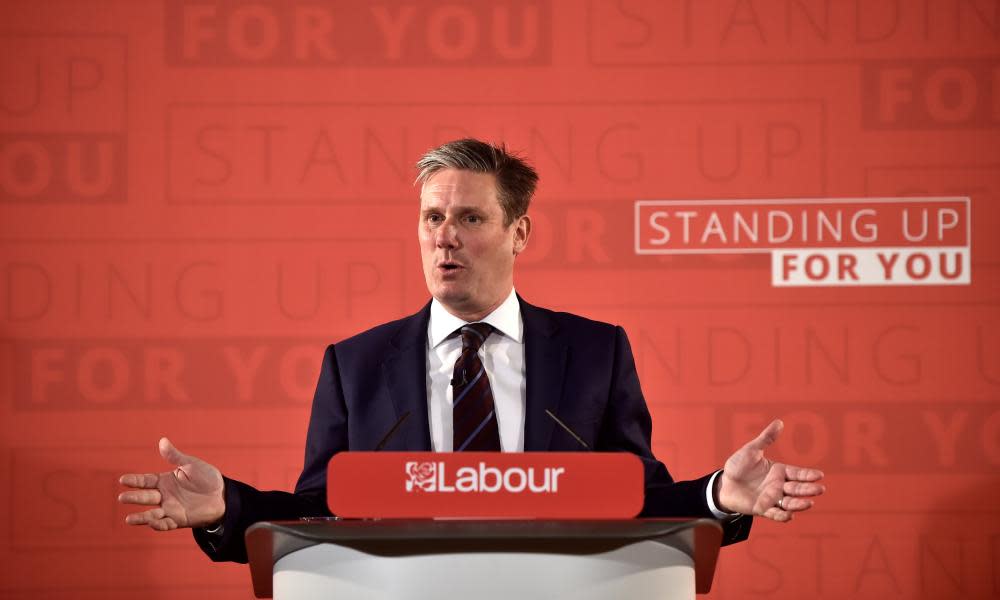The Guardian view on Labour’s Brexit: out of the EU, but close to it | Editorial

Labour’s policy on leaving the European Union is probably best summed up by the Rolling Stones line “you can’t always get what you want”. On Tuesday morning the party’s Brexit spokesman, and one of its brightest talents, Keir Starmer, tried to explain what Labour’s policy on leaving the EU was and what it was not. Until recently Labour had tried to be many things, understandably so because the party had to bridge the gulf between its remain-voting and leave-voting seats. Since parliament, with the support of most Labour MPs, voted to trigger Article 50, the party’s position has become clearer. Rightly, Sir Keir insisted that EU nationals won’t be bargaining chips in forthcoming talks. He also outlined a significant shift on immigration. Even a few weeks ago, Labour’s position was perceived to be soft on freedom of movement. Labour’s policy is now to prioritise jobs, workers’ rights, and living standards in Britain over the right for people to work and travel around the continent. It is undeniable – and a tragedy – that Britain’s vote to leave the EU was founded on fears over immigration.
Sir Keir’s position, at first glance, looks very much like the one offered by his Conservative opponents. Both Labour and the Tories now accept restrictions on freedom of movement despite the implications for access to the single market. Both will have a vote in parliament on the deal, although Labour envisages time to go back to Brussels if MPs reject it. Both parties want the best deal possible for Britain. Sir Keir differs from the Tories in that he would start negotiations with all options on the table and drop them one by one until a deal is reached. Theresa May would start from a blank sheet of paper and work out a deal that both sides could agree on. So far, so similar. The difference is that Sir Keir has declined to explain what would happen if the EU told Britain that the deal on offer in March 2019 was a “take it or leave it” one. When pressed he said the country could fall back on transitional arrangements and contingency measures – an answer that felt like a political deus ex machina conjured up to escape a seemingly unsolvable problem. If Mrs May could not get a deal from EU that she found agreeable, then Britain would crash out of the EU. This would be a disaster for the country, and a warning about the strength of the hardline Euroscepticism in the Tory party that seeks to remould the country as regulation-lite tax haven on the edge of Europe.
There was an easy way out for Sir Keir. He could have said that he would ask parliament to invoke clause 3 of article 50 to ask the government to seek an extension of the two-year negotiating period. The EU is, after all, a union of democracies. If MPs asked for an extension the pressure would be on Brussels to concede it. If Sir Keir ends up as a member of a Labour government, however unlikely that looks, he might still take this course of action. But Sir Keir cannot make this sensible suggestion policy now because he has to face the world as it is, not how he might want it to be. To engage in the hypotheticals of perhaps staying in the EU until we get the departure deal Britain wants would be taken as trying to avoid leaving. It would be jumped on by the Europhobic press, and would risk the prospects of loyal Labour colleagues in “leave” areas.
Currently voters are more likely to ask “why haven’t we left?” than “why aren’t we staying?”. That might change as the cost of Brexit becomes clear. Unlike the Lib Dems, who have made it their unique selling point, and at best will get a few dozen seats, Labour cannot now offer a second referendum, nor membership of the single market. Tony Blair asks Labour to ensure that Mrs May has no blank cheque on Brexit, and Sir Keir has done what is politically possible. The fact is we are leaving the EU. In doing so Britain must seek the closest relationship with Europe while rebuilding the public finances. Britain might not get what it wants, but as Mick Jagger drawled, “if you try sometimes, well you just might find you get what you need”.

 Yahoo News
Yahoo News 
